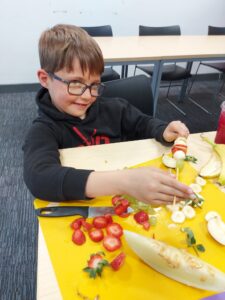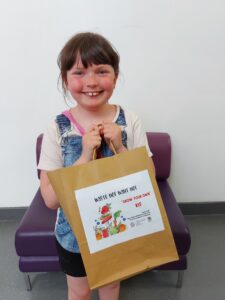A Wirral charity is using the enthusiasm and passion of young people to help stop perfectly good food from going to waste.
Based at The Hive on Bright Street, Birkenhead, Wirral Youth Zone has been running the Waste Not Want Not project for almost a year after receiving funding from the Merseyside Recycling & Waste Authority and Veolia Community Fund in June 2020.
The project has been cutting food waste by giving young people the skills to cultivate and cook their own food and arming them with nutritional knowledge and know-how. Participants (aged 8-19) are being taught how to grow fresh ingredients, cook meals from scratch, and use up leftovers, all while keeping waste to a minimum.
An estimated 140,000 tonnes of food is wasted in the Liverpool City Region each year. A lot of this could still be used and would save the average family £720 a year in groceries. It is this behaviour the project is hoping to have an impact upon.

Stuart Barnes, CEO of Wirral Youth Zone, said: “We are providing young people who attend The Hive with the knowledge, skills and confidence to cook simple, healthy and well-balanced meals. Through our informal cooking sessions, we want to inspire young people to believe they can make a difference to their health and the environment through the choices they make with food.”
Waste Not Want Not’s mission is to prevent and reduce waste through teaching young people how to repurpose leftovers and be more sustainable in the kitchen. The training sessions demonstrate not only recipes from popular ‘to be binned’ ingredients but also how to recycle ingredients, what to do with leftovers and using alternatives to cling-film, minimising waste, water and eco-friendly cleaning materials. Throughout the 40-week project, young people have been receiving opportunities to visit supermarkets, Recycling Centres, community centres and allotments to learn about worldwide food and learn how to grow their own.
Stuart Barnes continued: “Participants have been learning about portion planning and portion sizes, shopping lists, food storage, understanding best before/use by dates, using leftovers and how food is grown. We want to ensure young people can cook healthy food on a budget, save money for their family and think about food and waste as a resource to be valued and not thrown away.”
Wirral Youth Zone received £7826 from the MRWA Community Fund to deliver the project, which has so far directly engaged with 240 young people. It is hoped that almost three tonnes of food waste will have been avoided at the end of the 40-weeks.

Carl Beer, Chief Executive of MRWA, said: “Food waste is a big issue with significant environmental effects. Projects like Waste Not Want Not can get people to recognise that the food they buy exists within a circular economy – from farm to fork – while having a real impact in reducing household food waste. Giving young people the skills to grow and cook their own food will last them a lifetime.”
Ends
News to editors:
• Attached picture captions: The young participants in the Waste Not Want Not project by Wirral Youth Zone (PERMISSION HAS BEEN GIVEN TO USE THESE PHOTOGRAPHS).
• Wirral Youth Zone, named by young people as ‘The Hive’, is a purpose-built facility for young people aged 8 – 19, and up to 25 for those with disabilities. Completed in 2016, the Youth Zone offers a wide range of activities for young people aged between 8 and 19 (and up to age 25 for those with a disability), including; dance, sport fitness, music and media.
• Merseyside Recycling and Waste Authority is responsible for the disposal of municipal waste on Merseyside. Established in 1986 following the abolition of Merseyside County Council, it is a statutory Authority that works with all the local authorities on Merseyside – Knowsley, Liverpool, Sefton, St Helens and Wirral. MRWA takes a lead in advocating recycling, waste minimisation and safe and effective disposal of waste for Merseyside residents.
• The MRWA and Veolia Community Fund 20/21 has seen 15 community groups from Merseyside and Halton share £150,000 to help make the region a cleaner and greener place. The financial support will see the groups help reduce household waste, encourage recycling and resource re-use, and prevent carbon emissions.

